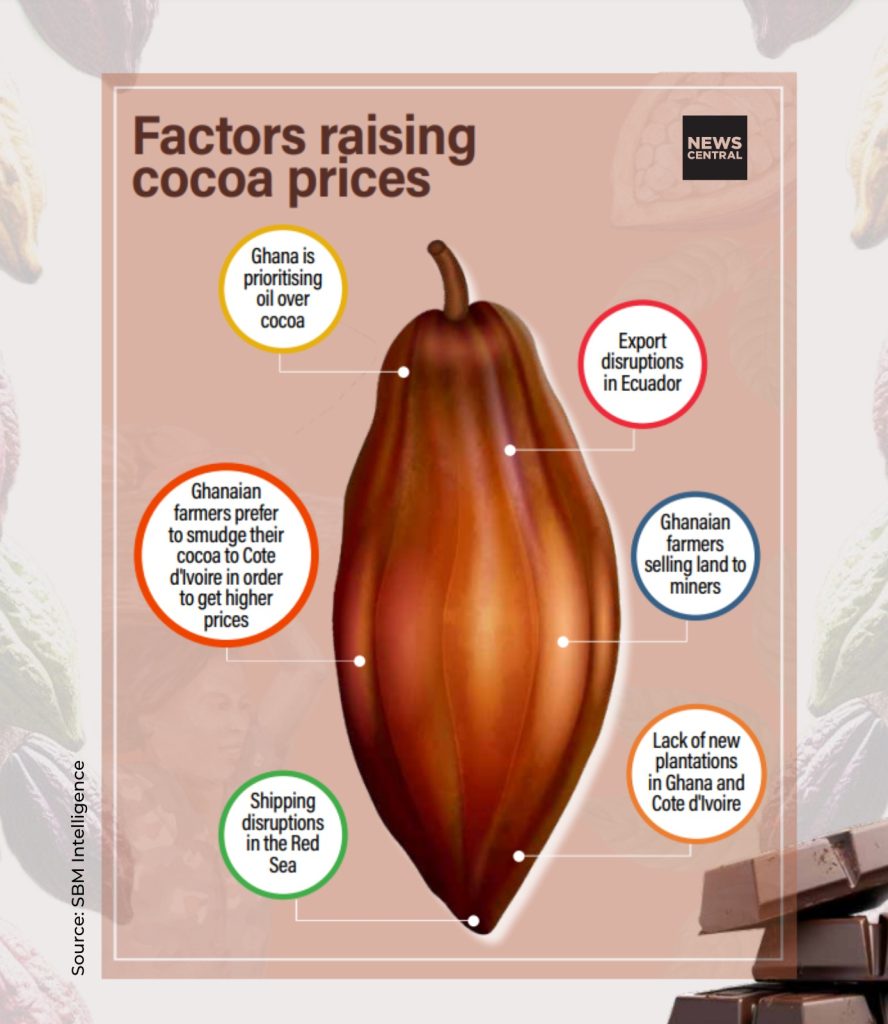In recent times, the global cocoa industry has encountered severe disruptions that extend far beyond its fields. As the backbone of the chocolate industry, cocoa’s tightening supplies and soaring prices are reshaping the economic landscape for chocolate manufacturers and consumers worldwide. According to a recent report by SBM Intelligence, “The global cocoa industry faces unprecedented challenges as cocoa supplies tighten and prices surge, impacting chocolate manufacturers and consumers worldwide.”
Chocolate in the Crossfire: Navigating Geopolitical Tides
Cocoa prices are notably influenced by geopolitical events. Increased freight rates resulting from Houthi attacks in the Red Sea and export disruptions in Ecuador have significantly contributed to the rising cocoa prices. Additionally, in regions like Côte d’Ivoire, political tensions exacerbate the situation. The SBM Intelligence report highlights that, “Geopolitical events such as increased freight rates and export disruptions have also contributed to the rise in cocoa prices.” This has led to severe shortages, prompting nations to navigate a complex geopolitical landscape to sustain their cocoa exports.
The Global Ripple of Cocoa Price Surges
The fluctuation of cocoa prices has a domino effect on the economies of major cocoa-producing countries and the global market. As cocoa prices skyrocket, the impact reverberates through retail prices globally, raising concerns about the sustainability of chocolate demand. “Cocoa prices have skyrocketed, impacting retail prices globally and raising concerns about the sustainability of chocolate demand,” as detailed in the SBM Intelligence report. This scenario poses a significant risk, particularly for economies heavily reliant on cocoa exports like Ghana and Côte d’Ivoire.

Price Spikes Alter Consumer Choices
With the rise in chocolate prices, consumers are compelled to reassess their spending habits. The increase could potentially shift demand towards cheaper snack alternatives or lesser-quality chocolate products. During the early stages of the COVID-19 pandemic, chocolate industries like Hershey and Nestlé saw a surge in profits due to increased demand. However, these companies are now facing the challenge of maintaining consumer loyalty amidst rising costs.
Farmers on the Frontline: The Bitter Side of Cocoa
Farmers are arguably the hardest hit by the cocoa crisis. They face numerous challenges, including unfair farmgate prices and inadequate government support. The report suggests a sustainable approach: “One potential solution involves prioritising measures to increase cocoa output and ensuring fair prices for farmers.” By adopting sustainable farming practices, there is an opportunity to improve the livelihood of farmers and the resilience of the cocoa industry.
Supply Chain Challenges and Future Outlook
The decline in cocoa production is attributed to several factors, including adverse weather conditions, diseases like the swollen shoot, and the aging of cocoa trees. The Morgen report states, “Recent data indicates a substantial decline in cocoa bean production projections for the 2023/2024 crop season in both Ghana and Côte d’Ivoire.” These production challenges are compounded by disruptions in the supply chain, escalating the costs further and impacting the availability of chocolate worldwide.

The future of the cocoa industry hinges on collaborative efforts among stakeholders. Governments, businesses, and farming communities must work together to stabilise cocoa prices and promote sustainable practices. The report optimistically concludes, “By adopting a proactive approach and embracing innovation, Ghana and Côte d’Ivoire can overcome the current cocoa crisis and build a more resilient cocoa industry.” This proactive and innovative approach is crucial for ensuring that cocoa farming remains viable and that chocolate continues to be a sweet treat for consumers around the world.
The rising cocoa prices are more than just a market fluctuation; they represent a critical juncture for the global chocolate industry. Addressing this issue requires a comprehensive understanding of the various factors at play—from geopolitical tensions to economic impacts and consumer behaviour. Only through a concerted and informed effort can we ensure the sustainability of chocolate, a beloved commodity across the globe.


